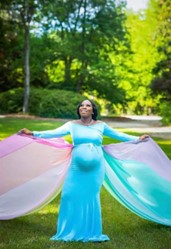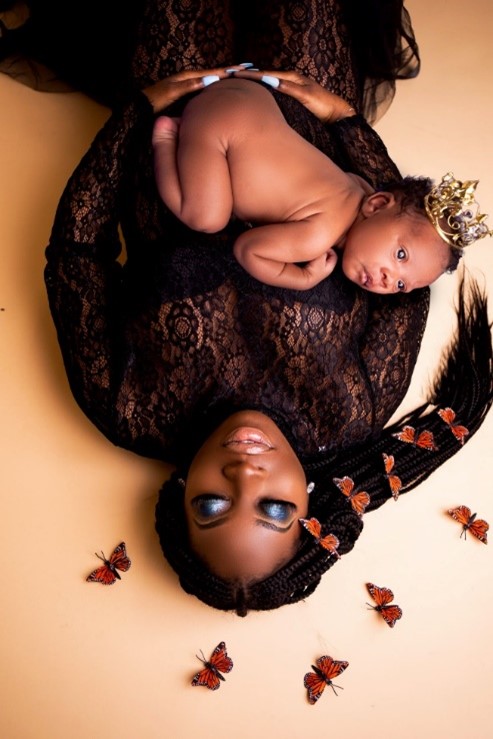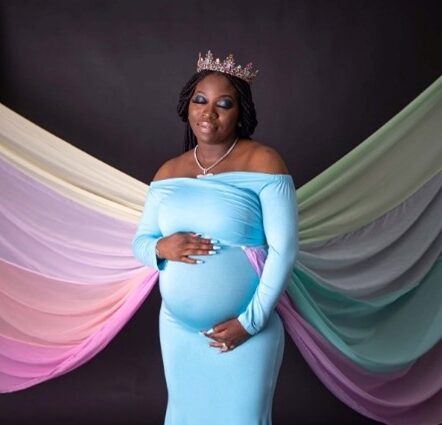Dedicated to Shaquilla “Quilla” Sherelle June
8.13.1991- 5.16.2021
Content Warning: Maternal Death, Racism
The eve of this disaster was the happiest of occasions. I had just celebrated my greatest accomplishment thus far: graduation with my master’s degree in public health. I walked the stage at Williams-Brice. I moved my tassel from the right to the left. I threw my fake paper diploma in the air and cheered. It was done, my education a chapter in my life I could finally close.
I arrived home to a party in my honor. Family and friends gathered to imbibe, dance, and celebrate. Even better, my cousin Quilla had just arrived home with her precious baby boy in tow. We video chatted, a promise to visit the next day to meet baby Johnathan. I was so glad she was home, recovering with her sweet boy.
The night concluded with pizzas, dance battles, and great times. The kind of fun you have where it’s suspicious, like there’s no way you should be allowed to have this much fun without something bad happening. I considered that and paused. But my greater senses kicked in and said “Relax, it’s okay. You are allowed to have fun without something bad happening. Enjoy the moment.” So, I did.
The next morning, I was notified that one of our party guests, my cousin Mya, left her phone at our house, in my mom’s room. No problem, they were on their way back to get it. My husband and I were sitting outside in the warm May weather, having a morning chat, still on a high from the previous day’s events. Seemingly out of nowhere, my mother appeared, sticking her head out of the front door with Mya’s phone to her ear. Without warning, she spurted, “Quilla is dead.”
Quilla, the same cousin who, as kids, laid in bed with me and contemplated the future. Our eldest first cousin: the one who dated first, drove first, went to college first. The one whose footsteps we were to follow. The one I had spoken to less than 12 hours before. How could she be dead?
I retreated to the house, staring at the wall in paralyzed silence, knowing the unfortunate truth. She was a black woman, in America, freshly postpartum. She was at a 3-4 times higher risk for pregnancy related complications that lead to death. ¹ Seeing the statistics is one thing- it made Maternal Mortality seem metaphysical, like a Boogeyman that creeps up in our nightmares. But to experience it was harsh- the unfortunate reality of American life. At 29 years old, Shaquilla Sherrelle June became the next casualty of white supremacy.
My heart broke, specifically for Johnathan, who had to live his life without his mom. But at the same time, I was angry. I was angry at him for being born. Angry at him for taking Quilla. Angry at all babies for being so life threatening to their mothers. Angry at white supremacy, at patriarchy, at the “medical professionals” who said it was okay to discharge a pre-eclamptic mother who complained of fluid in her chest, barely a day after giving birth.
Quilla was measured, careful and responsible. She didn’t experience food insecurity or housing instability. She was college educated. She had a good job. All those things were supposed to be protective factors. But none of them mattered because of the color of her skin. No one believed her when she said she was in pain or that it was hard to breathe. She also suffered from prenatal depression and gestational diabetes. During her maternity pictures, she said she wanted wings and to fly. She requested to be buried at Job’s Mortuary, where her body ultimately lies. She knew, subconsciously, that she was dying.

It feels unfair that other women had the opportunity to raise their babies and Quilla didn’t. Unfair that she never got to take pictures with her own child. That so many have multiple healthy pregnancies and healthy babies, and she didn’t survive one. That if she would have been white skinned, she’d be at home right now. That now, when a black woman announces her pregnancy, every “Congratulations!” is laced with an undertone of I hope you don’t die.
Quilla’s mother, Shon, had to be overwhelmed. Joyous at her new grandchild, but terrified and upset because of her daughter’s death. Unsure of how she, 30 years after giving birth, must start over raising a baby boy- she’s never had a boy. She doesn’t get to retire and enjoy her grandchildren because she is fated to raise them. And I worry, what will come of Johnathan when his grandmother has approached her final years?
Quilla made the ultimate sacrifice–her life–for her son, who she won’t get to see grow up. She won’t see his first steps, hear his first words. She will never rest a hand on his belly while he sleeps to check for gentle breaths. She’ll never hear him call her “Mama.” Johnathan is orphaned.
Quilla should be here. She should be here cuddling her baby. She should have been resting and recovering after birth. She should be making doctors’ appointments and Tik Toks. She should have lived to have another baby. I wish Quilla was still sitting on that couch, where I last saw her, holding her baby boy.
This story is one of many. So many families of all races and ethnicities grieving expectant mothers. So many maternal deaths, 80% in fact, that could have been prevented². Countless children who could have had their mothers, but don’t. There is no happy ending to this story. My family continues to grieve every day, even two years later.
So, why do I tell you this? It’s to humanize these statistics that every day people are living. This life-altering experience motivates me to keep going. I will do whatever is in my power to ensure no one has to experience what my family has gone through. Until no child has to grow up without a mother. If you read this, I implore you to be part of the solution, not just the problem.
We must dismantle the patriarchal, white supremacist systems that lead to the untimely mortality and morbidity of moms and babies. This isn’t just a black female problem. This affects all Americans. The United States has a Maternal Mortality Rate that towers over all other developed countries. The World Factbook ranks the US #122 for maternal death, with 21 deaths per 100,000 births, as of 2020. ³ And it’s only getting worse- the rate increased to 32.9 deaths per 100,000 births in 2021. We must fight until all people have the resources they need to lead happy lives and have healthy pregnancies. We must demand change until every mother can go home alive with their babies. We must live by the tenants of Collective Liberation; none of us are safe until we all are.

References:
- Hoyert DL. Maternal mortality rates in the United States, 2021. NCHS Health E-Stats. 2023.
DOI: https://dx.doi.org/10.15620/cdc:124678. - Trost SL, Beauregard J, Njie F, et al. Pregnancy-Related Deaths: Data from Maternal Mortality Review
Committees in 36 US States, 2017–2019. Atlanta, GA: Centers for Disease Control and Prevention, US
Department of Health and Human Services; 2022. - “Country Comparisons: Maternal Mortality Ratio.” Central Intelligence Agency. Accessed August 4th https://www.cia.gov/the-world-factbook/field/maternal-mortality-ratio/country-comparison/

